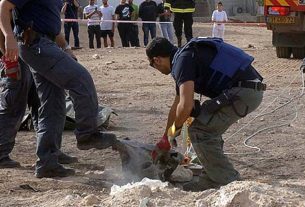
For example, the material that forms the roof of a sukkah (“schach”) must fulfill two conditions in order to be kosher: 1) it must have originally grown from the ground and 2) it must be currently detached from the ground.
Now, imagine that I have four walls forming an enclosed space in my backyard. All summer long, I let the grass grow, until the weeds are so tall that they reach the top of the walls and droop over the edges, forming a roof. Obviously, these weeds are not kosher schach, because they are still rooted in the ground.
But what happens if a week before Sukkos, I finally mow the lawn, and the tall weeds become detached from the ground. Is my sukkah kosher? The answer is no because I did not make the roofing of the sukkah; it just came into being as an accidental result of my mowing the lawn. In order to transform my weed-covered hut into a sukkah, I would need to pick up the weeds and actively place them on top of the walls for the sake of the mitzvah.
Now, the Vilna Gaon (cited in Sefer Kol HaTor 1:7) states that one’s entire body is involved in two mitzvos: the mitzvah of sukkah and the mitzvah to dwell in the Land of Israel. (the GR”A does not mention Mikvah). It turns out that the mitzvah of sukkah and the mitzvah of living in Eretz Yisrael are like sister mitzvos.
Therefore, he suggests that, just as we must actively make a sukkah, we must also be actively involved in building the Land of Israel to the point where everything is ready for Moshiach to come.
The GR”A says that we should not passively wait by saying, “When Moshiach comes, our shuls, batei midrash, and homes will fly to Eretz Yisrael, and only then, I will live there.” Rather, we should be actively involved in making an infrastructure in Eretz Yisrael, so that all Moshiach needs to do is build the Beis Hamikdash, which will be like icing on top of a cake.
The verse that we say every day in davening, “Uva L’Tzion Goel” (And a redeemer will come to Zion; Yeshaya, 59:20) hints to this idea as well. Rashi (ibid) explains this verse to mean that the redeemer – Moshiach – will come only to a built Zion. The Jerusalem Talmud (Yoma 3:2, 40b) elaborates further, saying that redemption will take place in small, gradual steps, like the sunrise. Our redemption is a process, and we must be active participants in making it come about.
Today, we are faced with the challenge of doing everything in our power to build and strengthen our attachment to the land of Israel. This idea is echoed in the Haftara read on Shabbos Chol Hamoed Sukkos which discusses the War of Gog and Magog (Yechezkiel, 38:18 – 39:16). Not only will this battle take place in Tishrei – the month in which we celebrate Sukkos (Nemukei Yosef, Megillah), but we are being reminded about the Mesirus Nefesh (self-sacrifice) we are supposed to have with respect to returning to the Land and building it up.
In this merit, may we be able to celebrate Sukkos – not just in our individual sukkahs, but also with “Sukkas David Hanofales” – the Holy Temple in a rebuilt Jerusalem.
Good Shabbos – Chol Hamoed Sameach, Warmest wishes, Aba Wagensberg
<!–
Publisher #16: JewishPress.com
Zone #113: Comment Banner / (02) / News
Size #15: Banner 468×60 (Comments and Mobile) [468×60]
–> ‘);
_avp.push({ tagid: article_top_ad_tagid, alias: ‘/’, type: ‘banner’, zid: ThisAdID, pid: 16, onscroll: 25 });



